- Home
- Steve Vernon
Sinking Deeper Page 2
Sinking Deeper Read online
Page 2
Have I mentioned Granddad Angus’s wild-as-the-wind imagination?
“That is about the single stupidest thing you’ve ever said,” I pointed out, not wanting to encourage such flights of fancy.
“You sound like your father,” Granddad Angus said. “You don’t really mean it.”
Don’t really mean it?
I guess I didn’t really mean it when I told Granddad Angus that sticking postage stamps to a fresh mackerel, addressing it to the Department of Fisheries, and dropping it into a mailbox to complain about their latest policy was not all that clever a plan.
I guess I didn’t really mean it when I told Granddad Angus that painting sunflowers on roadkill didn’t qualify as beautifying the town.
And I guess I didn’t really mean it when I told Granddad Angus it was a bad idea to put wagon wheels on a dory, hop inside, and roll the dory-wagon straight down Dead Dog Hill with only a hockey helmet and three pillows duct-taped to his behind for protection.
“What sort of a story is your life going to be if you don’t learn to turn up your imagination every chance you get?” Granddad Angus asked. “That’s the problem with you movie-watching, video-game-playing, cell-phoning kids these days. You haven’t learned to turn on the lights in your imagination yet.”
And that’s right about when Molly’s bedroom light turned on.
Chapter 3
Kamikaze Caber Chuck
Granddad Angus once told me the story of the Cape Breton Blue Mountain Banshee, a fiendish she-devil who would wail and scream and raise a racket just before somebody dropped stone-cold dead. Well, let me tell you, Molly wailed and screamed loud enough to make a full-grown banshee drop dead.
Dulsie did the smartest thing I’d ever seen a punk-goth-freakazoid do; namely, she took off running in the other direction. The last thing I saw was her chartreuse hair cat-burglaring right through the open garden gate. I admired her running form and wished I could run that fast or even in that direction, but there was no way on earth I could bail on Granddad Angus.
“Grab the caber,” Granddad Angus shouted.
He snatched up one end and I grabbed the other and we both started running. After cutting down Molly’s clothesline pole and flattening her pumpkins, there wasn’t anything left undestroyed except the garden fence. That is, until we knocked it over as we performed a battering-ram escape manoeuvre, which felt a little like I was leading a fast avalanche down the side of a cliff.
I kept on running and didn’t stop until Granddad Angus told me to. We were halfway down the middle of Deeper Harbour’s main street, meaning the only paved street in town.
“Straighten the caber out,” Granddad Angus ordered breathlessly.
I was still trying to catch up to my own breath, but I stooped and picked my end of the caber back up and we laid it down the centre line of the road—or at least where we remembered the line to have been. It hadn’t been repainted since a little more than two years ago, back when they paved the new highway that went around Deeper Harbour, cutting it off from the rest of the world.
At that point, Deeper Harbour basically fell off the map. In fact, the whole town might as well have fallen into the harbour. We could still get to the highway, but we had to go through two other towns to do it.
“Are we ready?” I asked.
“Almost,” Granddad Angus said, taking his hat off. “A few words need to be said.”
“Say them fast,” I recommended.
I could still hear Molly wailing away.
Granddad Angus wasn’t hurrying. He reached into his fanny pack. He called that fanny pack his sporran, but I knew a backwards fanny pack when I saw one. He fished out a can of Coke. He opened it up and handed the can to me. He reached into a pocket of his many-pocketed vest and drew out two shiny silver shot glasses.
“Pour them both,” he ordered. “There needs to be a speech.”
Granddad Angus loved his speeches.
“Molly Winter’s clothesline pole grew up from a Jack pine that stood watch over Deeper Harbour ever since Samuel Champlain sailed past back in the early seventeenth century and rudely refused to stop.”
I set the can down on the pavement. Meanwhile, Molly kept wailing. By now her wailing sounded almost musical, as if she’d figured out how to harmonize panic.
“The Jack pine stood there until some Acadian lumberjack lopped the tree down to hang Molly Winter’s sopping wet sail-wide granny panties on—so I don’t believe it will mind being transformed from a clothesline pole to a caber.”
“Amen,” I said, hoping to hurry him along.
“Bottoms up,” he added, tipping his glass straight back.
I tossed the Coke in my mouth and took a hard swallow.
“Good?” Granddad Angus asked.
“Good.”
“Should we chuck the caber uphill or down?” he asked.
“Uphill,” I decided.
“Why’s that?”
“Because I want to see if you can throw it hard enough and far enough to clear a path to the new highway.”
Granddad Angus grinned, spit on his hands, and pointed uphill. The two of us hand-over-handed the clothesline-pole caber upright. Then he crouched down, taking the proper caber-chucking stance while I did my best to keep it propped up.
The knots in Granddad Angus’s knees creaked and popped. He grunted as he laced his hands about the girth of the pole and slowly stood up. Just for an instant he stood there, the caber pointing towards the heavens in true Celtic caber-tossing style.
And then the caber began to tip slowly backwards.
Granddad Angus backpedalled with the big pole, finding his footing and twisting his direction as he went. I stepped backwards with him, kicking over the can of Coke. The spilled pop made a wet hissing sound as it fizzled into the dirt—like the sound of a burning dynamite fuse.
Then Granddad Angus starting running with the caber. He headed downhill towards the wharf, our plan of chucking uphill discarded in the name of gravity, momentum, and plain common sense.
I ran alongside Granddad Angus, wishing I could keep some distance between me and that clothesline-pole kid-crusher, but he was my granddad and I would not let him run on alone.
We kept on running as the road galloped towards the wharf.
The ocean beyond got closer.
The caber started to tip.
“Chuck it, Granddad,” I shouted. “Chuck it!”
He tried his best to keep up with the momentum of the twenty-foot clothesline-pole caber running madly away with itself. I saw Dulsie’s dad Warren’s boat shed flash past like a falling-down, paint-peeling, two-by-four comet. We hit the bottom of the hill and straightened out just long enough for Granddad Angus to unsuccessfully attempt to hide his panic.
“Chuck it,” I gasped, but the words came out something like, “Muck-phht.”
Granddad Angus grunted and gripped the caber as best he could. Just for an instant, I imagined that the soul of that Nova Scotia Jack pine had shot its laundry-stained essence down through the tangle of arthritic knots in Granddad Angus’s hands, angling through his knees and ankles and funky old kilt, straight on down into the dirt of that Maritime shoreline.
And then Granddad Angus let the caber fly free.
Picture the world’s ugliest totem pole taking flight. Throw in a little bit of rocket-to-the-moon, three measures of I-think-I-can-I-think-I-can, and a twist of crossed fingers for dumb luck, and you’re somewhere close to the notion of pure, unleashed caber-hood.
The caber shot straight up and toppled end-over-end upon the pavement in front of the shaky old wharf, continuing right on over the edge, and then—heavy end first—it smacked straight into the belly of Warren Boudreau’s dory, torpedo-holing the little wooden craft straight through.
For about three-quarters of a minute the sight of that capsize
d and caber-impaled dory was a truly grand and wonderful sight.
“Now what?” I asked. “Should we run?”
Granddad Angus couldn’t answer. He was too busy leaning against a weathered grey wharf piling, his hands spider-splayed about the curved timber, trying unsuccessfully to catch his breath.
It was times like these that I realized I had almost forgotten how old my grandfather really was. He usually seemed like a grey-haired schoolkid out for recess and ready to play. Now, looking at him, I saw the old man who was hiding behind his knock-knock-joke grin—pale and sweating, his eyes holding nothing but a deep, faraway stare…interrupted by my dad, walking slowly towards us, still wiping deep-fried grilled cheese sandwich crumbs from the dirty red thicket of his beard. Granddad Angus’s saw was tucked under Dad’s arm, so I guess he’d already visited Molly’s shamelessly demolished pumpkin patch.
“You dropped your saw,” Dad said.
He sounded almost helpful.
Granddad Angus managed a weak hello grin.
“Only a mule-headed Scotsman would think it a sport to steal a clothesline pole and run the length of a football field to heave it,” Dad observed as he stood there scratching his head and leaning on the wharf’s teetering railing, staring out at the wreckage of a caber-stuck dory.
Bedroom lights all around the harbour snapped on and people poked their noses out their bedroom windows. Deeper Harbour is awfully quiet most of the time, so a commotion like this was bound to wake up the whole town.
“Well,” Granddad Angus said, “at least we gave them something to look at.”
I stood beside my dad, staring at Warren Boudreau’s impaled dory drifting sadly across the lonely goodbye gulp of Deeper Harbour. The caber stuck straight up out of the smashed gut of the pine-and-oak dory, looking a little like some weird, petrified, prehistoric sea creature, drifting in the lee and gentle swallow of the harbour.
It was most definitely something to look at. And looking back at that long-ago-then from the safety of my right-about-now, I think that was the exact moment I first started to kick around my crazy idea to revive a dead town.
Chapter 4
The Yowling Howl of a Musical Saw
BANG—clack.
The second scariest sound I ever heard was the slam of the cell door and the clack of the bolt latching shut as Dad locked Granddad Angus and me in jail—for real.
“You need to consider the consequences of your actions,” Dad told me while he patched the broken window with a flattened cardboard box.
“Consequences” is one of those words—like “responsibility,” “expectations,” and “homework”—that grown-ups feed you. One of those words that tastes like spoonfuls of boiled, unbuttered, unsalted, and un-cheese-sauced cauliflower. I tasted that word while Granddad Angus rattled the steel window-breaking file against the cell bars—clanter, clanter, clanter.
Dad banged the last tack into the cardboard window patch, which fell to the glass-strewn floor at the exact moment that someone banged hard on the outside door.
THUDTHUDTHUDTHUD.
“Maybe it’s the prime minister of Canada,” Granddad Angus guessed. “Come to Deeper Harbour to hand out dory-sinking medals.”
“There is no way on earth the prime minister would come to a hole in the coast like Deeper Harbour,” I said. “I don’t even know what we’re doing here.”
Do you think I was being too hard on our town?
Let me put it in perspective for you.
If you look at a globe you’ll see Canada, a big stretch of open country that sits on top of the United States like a huge maple-leaf-scented, beaver-skin hat. At the eastern corner of Canada is the province of Nova Scotia, stretched out like a beached giant squid, with the Yarmouth, Digby, and Bridgewater end being its head and its tentacles wiggling up around the high country in Cape Breton Island.
Now get out your biggest magnifying glass and have a peek at the stretch south of Yarmouth and north of Cape Sable. Keep on squinting. Do you see that little fly pimple of a harbour just next to the town of Goodbye and Good Riddance and I Hope You Don’t Drown on the Way Out With the Tide?
Well, we’re just a little to the left of that.
They say tourists used to visit our town from time to time, but I find that hard to believe. Deeper Harbour couldn’t attract tourists if we built our own fantasy theme park and advertised free rides on flying dinosaurs.
Not even before they built that new highway.
You see, Deeper Harbour doesn’t have much in the way of tourist attractions. In fact, it doesn’t have anything at all. We’ve got a pizza shop that specializes in salt cod and pork scraps. We don’t have a McDonald’s. We don’t have a movie theatre. We don’t have anything at all but a complete lack of expectations.
Hypothetically speaking, I could be exaggerating how bad things really are in Deeper Harbour, except I couldn’t spell the word hypothetically if I gargled a bucket of alphabet soup while chewing on a dictionary sandwich. The fact is that life in Deeper Harbour isn’t really as bad as I’m telling you.
It’s a whole lot worse.
So when Warren Boudreau, Dulsie’s dad, stomped into the police station in a bathrobe, jeans, and a pair of fuzzy brown sasquatch slippers, I wasn’t the least bit surprised.
“You sure didn’t waste any time getting here,” Dad said.
“It was a lucky thing I was sitting by the phone at three in the morning just waiting for Molly Winter to tell me some crazy man in a kilt had thrown a stolen clothesline pole straight through my only dory.”
Warren kept on complaining, only stopping for breath every three or four rants, while Dad sat down at his desk and rummaged through the drawer. I watched closely as Dad fished out a pair of earplugs and worked them into his ears.
Meanwhile, Granddad Angus propped the saw between his feet and chin, leaning on it until the blade bent into a giant letter S, and began tuning up a rendition of “Farewell to Nova Scotia” on his musical saw, using a small homemade bow that he had previously constructed from fishing line and a small wooden ruler. He’d pulled the bow from out of his many-pocketed fishing vest.
“You let him keep the saw?” Warren asked.
“And a file too,” Dad answered. “I’m waiting for him to try to escape before I shoot him in the kneecaps a couple of times.”
Granddad Angus was far too busy making his own particular brand of music to notice all of that divinely inspired sarcasm. There is nothing that sounds quite so weird as a musical saw, all deep and moonish and eerie, as if someone were drowning a giant mutant screech owl in the belly of a kettle drum about a thousand miles beneath the ocean.
A vein on Warren’s forehead swelled up and pulsed in harmony with the caterwaul saw. It looked a little like a radioactive caterpillar had crawled beneath his skin and was giving birth to the Loch Ness Monster while sumo wrestling with Godzilla, which—
BANG!
My mom, the mayor of Deeper Harbour and the woman divorcing my dad, walked in and slammed the door behind her.
The whole room shook for a minute before becoming quiet.
“Take those earplugs out of your ears,” Mom said to Dad without missing a beat.
Dad yanked the earplugs out as if his earwax had caught fire.
“I didn’t do anything,” I said, which was how I started most conversations with Mom.
“Your son wrecked my dory,” Warren said, pointing at me. It didn’t sound like he’d figured out Dulsie was part of our caber caper yet—and that was probably for the best.
“He had help, you know,” Granddad Angus butted in.
“Warren, I can’t remember the last time I saw you out in that dory,” Mom said.
“I was saving it for when the tourists came back,” Warren explained, looking hurt. “I figured I could give rowing tours of the harbour. Tourists are just hunger
ing for that sort of cultural experience.”
Hungering?
I giggled, picturing a horde of undead zombie tourists stumbling off a rusty black bus, their arms stuck out Frankenstein-straight, moaning for brains, postcards, and t-shirts.
“Warren, you have got to stop reading those tourism brochures,” Mom said, shaking her head sadly. “Your boat shed and the old wharf are both nearly ready to tip over into the sea. They should have been torn down years ago.”
Then she turned to Granddad Angus. “It’s a good thing you’re so handy with that saw of yours—since you seem to be responsible for sinking Warren’s dory, you can drag it up to the shore and help Warren patch it.”
Granddad Angus didn’t like that. Neither did Warren.
“I don’t want that man anywhere near my dory,” Warren said.
“I don’t remember asking your opinion,” Mom said, turning to look at Dad. “Have you told your son what we’ve been talking about?”
Dad didn’t say a word. He looked down at the floor. I think he was wishing he’d kept his earplugs plugged in.
Mom looked at me.
“What?” I asked, trying hard to keep that you-know-what tone out of my voice.
“I’m going to get your father to unlock this cell and let you go free.”
That was good news.
“I want you to take the time this summer and play just as hard as you can.”
Also good news.
“I want you to spend as much time with your father and your grandfather as you can. I also want you to help your grandfather patch up Warren’s dory…because by the end of the summer you and I are leaving Deeper Harbour. We’re moving to Ottawa.”
Leaving?
All of a sudden everyone started talking at once.

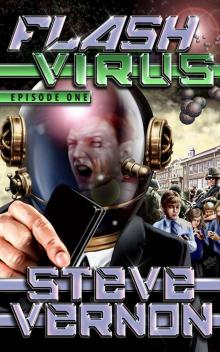 Flash Virus: Episode One
Flash Virus: Episode One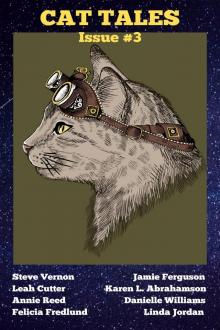 Cat Tales Issue #3
Cat Tales Issue #3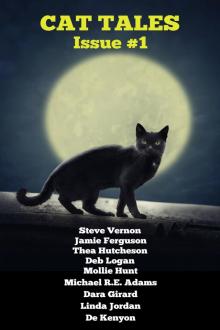 Cat Tales Issue #1
Cat Tales Issue #1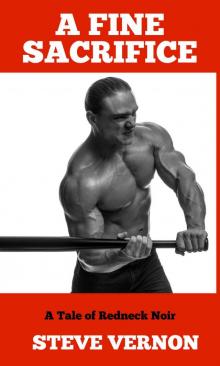 A Fine Sacrifice
A Fine Sacrifice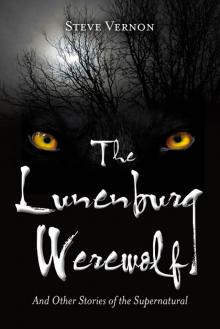 The Lunenburg Werewolf
The Lunenburg Werewolf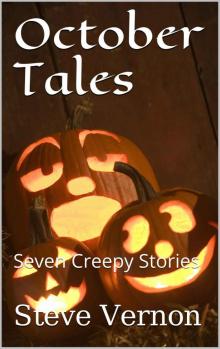 October Tales: Seven Creepy Stories (Stories to SERIOUSLY Creep You Out Book 1)
October Tales: Seven Creepy Stories (Stories to SERIOUSLY Creep You Out Book 1)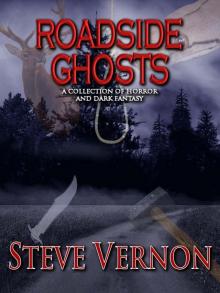 Roadside Ghosts: A Collection of Horror and Dark Fantasy (Stories to SERIOUSLY Creep You Out Book 3)
Roadside Ghosts: A Collection of Horror and Dark Fantasy (Stories to SERIOUSLY Creep You Out Book 3)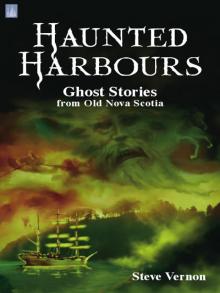 Haunted Harbours
Haunted Harbours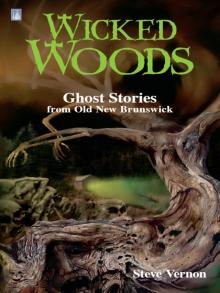 Wicked Woods
Wicked Woods Two Fisted Nasty: A Novella and Three Short Stories (Stories to SERIOUSLY Creep You Out Book 2)
Two Fisted Nasty: A Novella and Three Short Stories (Stories to SERIOUSLY Creep You Out Book 2)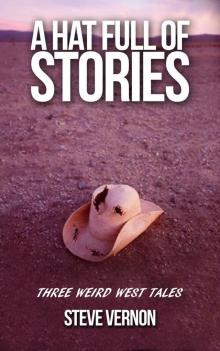 A Hat Full of Stories: Three Weird West Tales (Stories to SERIOUSLY Creep You Out Book 9)
A Hat Full of Stories: Three Weird West Tales (Stories to SERIOUSLY Creep You Out Book 9)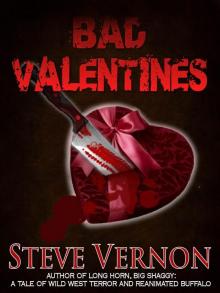 Bad Valentines: three twisted love stories (Stories To SERIOUSLY Creep You Out Book 7)
Bad Valentines: three twisted love stories (Stories To SERIOUSLY Creep You Out Book 7)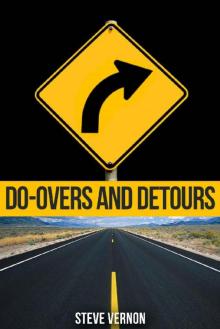 Do-Overs and Detours - Eighteen Eerie Tales (Stories to SERIOUSLY Creep You Out Book 4)
Do-Overs and Detours - Eighteen Eerie Tales (Stories to SERIOUSLY Creep You Out Book 4)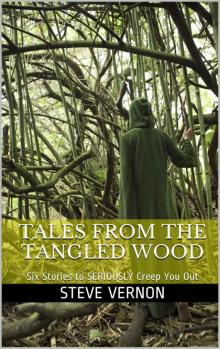 Tales From The Tangled Wood: Six Stories to SERIOUSLY Creep You Out
Tales From The Tangled Wood: Six Stories to SERIOUSLY Creep You Out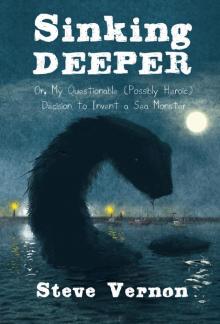 Sinking Deeper
Sinking Deeper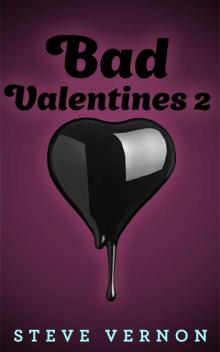 Bad Valentines 2: Six Twisted Love Stories (Stories to SERIOUSLY Creep You Out Book 5)
Bad Valentines 2: Six Twisted Love Stories (Stories to SERIOUSLY Creep You Out Book 5)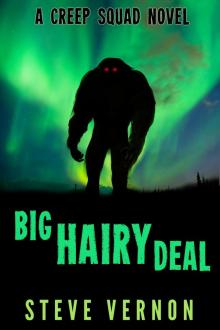 Big Hairy Deal
Big Hairy Deal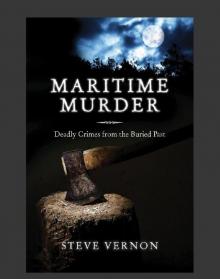 Maritime Murder
Maritime Murder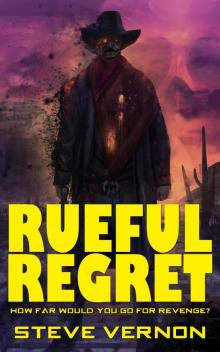 Rueful Regret
Rueful Regret